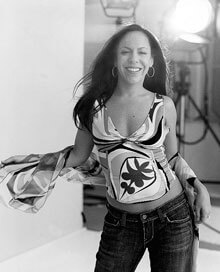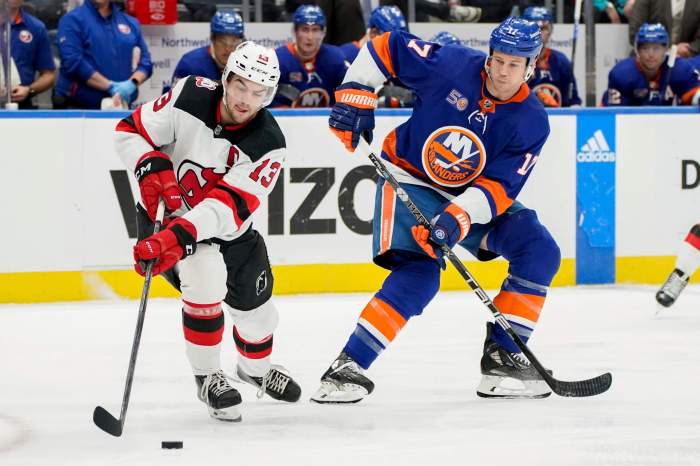Bebel Gilberto launches Joe’s Pub in Central Park
“Ah-gah-jew, ah-gah-jew. Ah-gah-jew-ewww-oooh.”
Her father Joao Gilberto is largely credited with creating the bossa nova. Her own mother Miucha, Joao’s second wife and a noted vocalist in her own right, joins Bebel for a duet on the new album.
“I already had the vocal so we just had fun,” Gilberto recalled. “It was summertime in Brazil and we were drinking wine celebrating that it was 70 degrees.”
Her mother taught her how to sing and she made her recording debut at age seven on one of Miucha’s album. Even her uncle, Miucha’s brother Chico Buarque, is a famous singer in Brazil. In fact, another writer might have called this profile “The Girl from Ipanema,” borrowing the title from Joao Gilberto and Stan Getz’ Grammy-winning 1964 collaboration with Astrud contributing the lilting, gorgeously smacked-out vocals.
Bebel is like that old nature-nurture debate wrapped up in a charming, vivacious package that naturally draws people. She doesn’t so much answer the genetics question as revel in it. Her voice has been compared to a blast of warm, tidal air so many times that if the singing doesn’t pan out, she can always find work as a hairdryer. She’s duality in a designer skirt. She knows this interview is for a gay newspaper, yet she flirts outrageously anyway.
“Go back to bed, honey,” she purred when we wrap up our 8 a.m. interview, yet she’s savvy enough to drop phrases like “You know Rufus, of course” when we get onto her latest album’s producer, Marius de Vries, who also works with her “gay boyfriend” Rufus Wainwright.
Born in New York and a resident of the East Village since 1991, Gilberto grew up in Brazil with which she has a love-hate relationship. Like most things Bebel, it’s complicated. Her father’s reputation has evolved into something approaching compound recluse though fans still talk about their 1998 Carnegie Hall reunion for a duet that was received by a rousing 15-minute ovation.
“There is a difference between being a superstar and being a genius that people cannot reach,” Bebel explained. “As I got older I understood the dimension of how big my father was, but he is more respected outside Brazil than inside Brazil. There’s this fame around him where people think he’s this crazy guy and no one knows what he’s going to do next when he performs.”
It’s quite a legacy, but after lamely offering veterinarian as an alternative career—it comes out more question than answer—Gilberto admitted, “It’s in my blood, I really never tried to do something different.”
The gorgeous woman peering out from the front of her album cover, name tucked into luscious, raven locks like a rain forest flower, was shot by renowned fashion photographer Mario Testino. It’s certainly not the first time she’s been in front of his lens. Gilberto’s racked up almost as many tear sheets as fellow Brazilian Gisele Bundchen, but the evolution of the Mario Testino album cover is classic Bebel.
“I’m very lucky and I’m an outgoing person,” she began, trying to answer the question as to how one becomes a fashion zeitgeist. “And I’ve always had many, many gay friends. I think that helps a lot. Like Mario. I met him, I was a big fan of his for more than 15 years and then one day I realized that he was my friend.”
At this point I don’t know if she means they were shopping or dating. Were they lovers or a gay couple?
“I cannot go deeper than that because he’s a very private person,” Gilberto said with a laugh. “But I’m sure you’ll assume how I met him, and that’s what it is. We became very good friends and I told him that my dream was to have him doing my cover. We shot the pictures in Brazil. That’s how it happened. We know many friends in common as well. I met Pedro Almodovar and all these interesting people and they are really being helpful.”
Testino, Wainwright, Almodovar… but Gilberto was not just dropping names. It was more charming than that, but she could see it’s working. And it’s the way she works. She already has collaborations with everyone from Caetano Veloso to Deee-Lite’s DJ/producer Towa Tei under her belt and she credits suited hipsters The Thievery Corporation with “coaching me and putting me together when I toured with them in 1996.” David Byrne is a collaborator and friend.
“He helped me find musicians for my own band when I first arrived in New York,” Gilberto remembered. “And when I finally made it, he was really happy for me.”
But then she broke out the big guns: Carmen Miranda. The phrase “My father reminds me a lot of Carmen Miranda,” would buy most readers a few years on a therapist’s couch, but for Gilberto it’s all part of the long winding road that brought her to New York.
“In a way it’s funny,” Gilberto said, “but Carmen Miranda got more famous outside Brazil than inside Brazil, but I was crazy about her when I was a little girl. I thought she couldn’t be more extraordinary or full of different aspects. She would design her clothes and she was an actress and singer at the same time, but after she came to Hollywood and then went back to Brazil she was received with tomatoes. People really criticized her for being so famous in Hollywood so it wasn’t a good experience for her when she came back to Brazil. Then she recorded a song making a joke about becoming so Americanized.”
At this point, Bebel began to sing Carmen Miranda and it’s almost enough to make one blow a gay gasket. Could the title role in “The Carmen Miranda Story” be that far off on the horizon?
“I would love to,” she admitted, “but I think we have to go step by step.”
As for Brazil, Gilberto feels like her country is enjoying a cultural renaissance of sorts, but she still resents a certain provincialism that was so hurtful to Miranda.
“People are really paying attention to Brazil right now,” she said proudly. “We’re getting closer and closer to becoming very well known for all the different things we’re doing including film and fashion and, of course, music. I’m really pleased to be part of that, but I have to tell you, when I return to Brazil, my experience isn’t too good.”
She recalled a recent TV performance.
“People were raising their eyebrows at me,” she said. “There were a lot of artists from Brazil and it was difficult for me because they didn’t understand what I was trying to do. The songs I was singing in English weren’t really well received. I don’t know how it is here, but if someone moved to Brazil and was very successful, I imagine people from the United States would wonder why she had to go to another country to become famous.”
It’s something she has had to consider because success in today’s ailing music market requires nothing less than world domination.
Despite her self-doubt, though, Gilberto’s optimism usually wins the day. The immediate future holds a gig in a city that ranks not only as home but her favorite performance venue. From memorable childhood Carnegie Hall performances with her family to a Summer Stage date in Central Park, Manhattan is a town she knows well enough to joke that her Delacorte Theater gig will likely serve as the soundtrack for clandestine trysts in the adjacent Rambles.
“But I want them to come to my show first!” Gilberto exclaimed.
And New York?
“This is where my bed is,” she said. “I like to wake up late and then go to my little garden and work in it. Then I cook something healthy and have some friends at home. That’s a perfect day for me.”
And the perfect night?
That’s waiting for anyone who decides to make a date with Bebel under the stars in Central Park. Who knows where she’ll decide to throw the after-party.


































